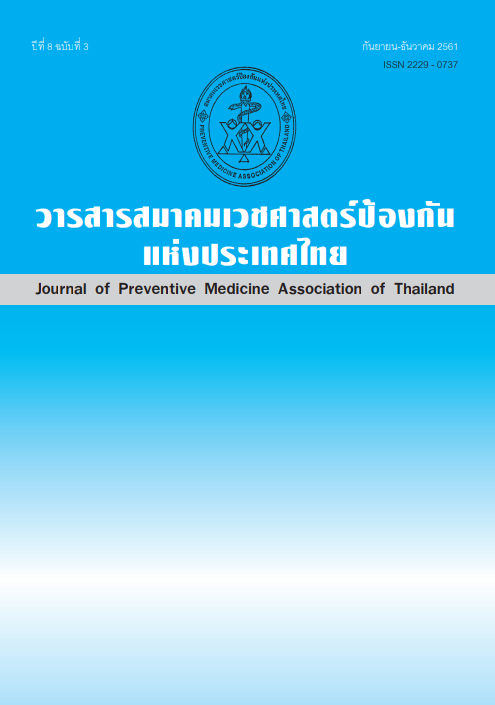Healthcare Personnel Safety and Tuberculosis
Keywords:
healthcare personnel, tuberculosis, latent tuberculosis infection, control, health surveillanceAbstract
WHO End tuberculosis (TB) Strategy has been globally adopted. Thailand is one of TB burden countries. Risk of TB is higher in healthcare personnel due to occupational exposure of contaminated droplet nuclei. Asymptomatic latent TB infection may occur after exposure. Later, the infection may progress to symptomatic and communicable TB disease. Healthcare personnel can be either source or receiver of TB transmission. Disease control in healthcare setting is also involved in quality assurance. Measures can be respectively implemented at administrative, environmental and personal protective levels. Evaluation of the disease control is recommended. Health surveillance in personnel is a useful tool for monitoring.
References
2. Beasley MB, Travis WD. The respiratory system. In: Rubin R, Strayer DS, editors. Rubin’s pathology: clinicopathologic foundations of medicine. 7th ed. China: Wolter Kluwer; 2015.
3. Bonnoci FG, nair N, Kamble SP. Tuberculosis control in the workplace. In: Schaaf HS, Zumala A, editors.Tuberculosis A comprehensive clinical reference: Saunders Elsavier; 2009. p.903-7.
4. World Health Organization., Regional Office for South-East Asia. Ending TB in the South-East Asia region:regional strategic plan 2016-2020. India: World Health Organization, Regional office for South-East Asia; 2016.
5. World Health Organization. Global tuberculosis report 2017. Geneva, Switzerland: WHO; 2017.
6. World Health Organization. Global tuberculosis report 2016. Geneva, Switzerland:WHO; 2016.
7. World Health Organization. Global tuberculosis report 2015. Geneva, Switzerland: WHO; 2015.
8. World Health Organization. Guidelines for the prevention of tuberculosis in healthcare facilities in resource-limited settings. (Writing committee: CDC, WHO, The Union) Italy:WHO; 1999.
9. Joshi R, Reingold AL, Menzies D, Pai M. Tuberculosis among health-care workers in low-and middle-income countries: a systematic review. PLoS Med 2006;3(12):e494.
10. สถาบันรับรองคุณภาพสถานพยาบาล. มาตรฐานโรงพยาบาลและบริการสุขภาพ ฉบับที่ 4. นนทบุรี:สถาบันรับรองคุณภาพสถานพยาบาล; 2561.
11. World Health Organization. Guidelines on the management of latent tuberculosis infection. Spain: World Health Organization; 2015.
12. บุญส่ง พัจนสุนทร, วิภา รีชัยพิชิตกุล, บรรณาธิการ. วัณโรคในบุคลากรทางการแพทย์. ขอนแก่น:กลุ่มวิจัยวัณโรค คณะแพทยศาสตร์ มหาวิทยาลัยขอนแก่น; 2543.
13. วิโรจน์ เจียมจรัสรังษี. ระบาดวิทยาของวัณโรคจากการประกอบอาชีพในบุคลากรด้านการแพทย์. จุฬาลงกรณ์เวชสาร 2546;47:353-64.
14. Corrin B, Nicholson AG, editors. Pathology of the lungs. 3rd ed: Churchchilllivingstone Elsvier;2011.
15. ไพรัช เกตุรัตนกุล. The pathogenesis of tuberculosis. วารสารวัณโรคและโรคทรวงอก 2545;23(4):33-5.
16. Menzies D, Khan FA. Nosocomial tuberculosis. In: Jarvis WR, editor. Bennett & Brachman’s Hospital Infections. 6th
ed. Wolters Kluwer: Lippincott Williams and Wilkins; 2014.
17. Department of health and human services. Guidelines for preventing the transmission of Mycobacterium tuberculosis in health-care settings. Morbidity and Mortality Weekly Report: Recommendations and Reports, 2005: December 30; 54:RR-17:1-144.
18. Menzis D, Schwartzman K, Pai M. Immune-bases tests for tuberculosis. In: Schaaf HS, Zumala A, editors. Tuberculosis A comprehensive clinical reference: Saunders London, UK: Elsevier Saunders; 2009. p.1-8.
19. World Health Organization. Systematic screening for active tuberculosis: Principles and recommendations. Geneva, Switzerland: WHO Document Production Services; 2013.
20. World Health Organization Latent Tuberculosis Infection: Updated and consolidated guidelines for programmatic management (LTBI) 2017 [Internet]. [cited 2017 Jan 30]. Available from:https://www.who.int/tb/publications/2018/latent-tuberculosis-infection/en/
21. ศรีประภา เนตรนิยม. แนวทางการดำเนินงานควบคุมวัณโรคแห่งชาติ พ.ศ. 2556. นนทบุรี: สำนักวัณโรค กรมควบคุมโรค กระทรวงสาธารณสุข; 2556.
22. Menzies D, Joshi R, Pai M. Risk of tuberculosis infection and disease associated with work in health care settings. Int J Tuberc Lung Dis 2007;11(6):593-605.
23 World Health Organization. Implementing the WHO Stop TB Strategy : A handbook for national tuberculosis control programmes: in Infection control in healthcare setting. Geneva, Switzerland: World Health Organization; 2008. p.60-4.
24. สำนักวัณโรค กรมควบคุมโรค. การป้องกันการแพร่กระจายเชื้อวัณโรค. ใน: แนวทางการควบคุมวัณโรคประเทศไทย พ.ศ. 2561. นนทบุรี:กรมควบคุมโรค กระทรวงสาธารณสุข; 2561.
25. Zwerling A, van den Hof S, Scholten J, Cobelens F, Menzies D, Pai M. Interferon-gamma release assays for tuberculosis screening of healthcare workers: a systematic review.Thorax 2012;67(1):62-70.
Downloads
Published
How to Cite
Issue
Section
License
บทความที่ลงพิมพ์ในวารสารเวชศาสตร์ป้องกันแห่งประเทศไทย ถือเป็นผลงานวิชาการ งานวิจัย วิเคราะห์ วิจารณ์ เป็นความเห็นส่วนตัวของผู้นิพนธ์ กองบรรณาธิการไม่จำเป็นต้องเห็นด้วยเสมอไปและผู้นิพนธ์จะต้องรับผิดชอบต่อบทความของตนเอง






